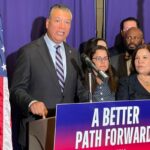In May 2025, the Department of Homeland Security(DHS) published a list of more than 500 jurisdictions identified as “sanctuary cities,” accusing them of not cooperating with federal immigration laws.
However, following a wave of criticism for errors and lack of transparency, the list was removed from the official DHS website.
Errors and Criticisms of the List

The list of sanctuary cities included cities and counties that, according to DHS, limited their cooperation with Immigration and Customs Enforcement (ICE).
However, several jurisdictions, such as Huntington Beach in California, protested their inclusion, arguing that they cooperate fully with federal authorities.
In some cases, the confusion was due to misunderstandings, such as in Shawano County, Wisconsin.
It was included because of its status as a “Second Amendment sanctuary,” related to gun rights, not immigration policies.
The National Sheriffs’ Association also expressed its displeasure, calling the list “arbitrary” and noting that it was compiled without consulting local authorities, which could harm interagency cooperation.
Withdrawal from the List and Reactions

In the face of criticism, DHS removed the list of sanctuary cities from its website and original press release.
Although Homeland Security Secretary Kristi Noem did not directly explain the reason for the withdrawal, she stated that the included jurisdictions provide sanctuary to undocumented immigrants.
La lista fue retirada del sitio web oficial del DHS
Huntington Beach Mayor Pat Burns called his city’s inclusion “negligent.”
He noted that in January 2025, the city council voted unanimously to declare the city a “non-sanctuary” city, pledging to collaborate with immigration agencies.
Implications for Immigrants

Although the list of sanctuary cities was removed, the Trump administration continues to pressure jurisdictions to cooperate with federal immigration authorities.
This could translate into increased oversight and possible federal funding cuts for cities that maintain sanctuary policies.
For immigrants, especially those without legal status, it is crucial to be informed about local policies and seek legal advice if necessary.
Knowing your rights and local laws can help protect you in an environment of increased immigration scrutiny.
For more information, visit QuéOnnda.com.























